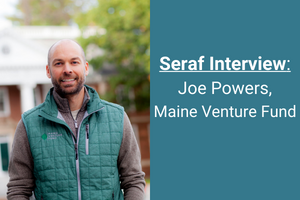 Joe Powers is the Managing Director of Maine Venture Fund. It is an early-stage, industry agnostic state sponsored fund investing in innovative Maine companies. He is excited about the opportunities they are seeing in what is an increasingly vibrant startup ecosystem here. For those seeking visibility into Maine deal-flow across software, hardware, manufacturing, food and beverage, healthcare, education, climate and more, check out their website to be added to their co-investor database and connected with companies that fit your investing thesis.
Joe Powers is the Managing Director of Maine Venture Fund. It is an early-stage, industry agnostic state sponsored fund investing in innovative Maine companies. He is excited about the opportunities they are seeing in what is an increasingly vibrant startup ecosystem here. For those seeking visibility into Maine deal-flow across software, hardware, manufacturing, food and beverage, healthcare, education, climate and more, check out their website to be added to their co-investor database and connected with companies that fit your investing thesis.
Joe, thank you for participating. We are wondering, what qualities or characteristics do you look for in entrepreneurs before deciding to invest in their ventures?
Transparency first and foremost. CEO's are typically the primary sales person in a startup, but when they interact with investors (and board members) they need to be able to pivot to a more self-critical, open and communicative style. Also, they need to have a solid understanding of the company's financial statements and an appreciation of the importance of measuring and tracking progress in general, which makes it possible for advisors around them to offer productive guidance.
What advice do you have for entrepreneurs seeking angel investment and how can they best prepare for pitching to investors?
There's an adage in the business: "when you're looking for advice, ask for money; when you're looking for money, ask for advice". In other words, founders need to first establish a relationship with investors in order to generate the excitement and interest required to write a check. For angel investors, this is especially true; most are not professional investors managing other peoples' money, but are leveraging their personal wealth to support a founder and cause about which they care deeply. So establishing relationships and finding those "values aligned" friendlies early, before the investment need is critical, pays dividends when it comes time for the ask. It may go without saying that careful tracking of all of these "coffee dates" is equally as important - treat it like a sales process and use a CRM or tool like Seraf - so that this enormously time consuming activity results in a well organized list of folks who are primed and ready to cut a check when you finally do announce your raise.
What are some red flags or warning signs that may deter you from investing in an entrepreneur?
Like any intimate relationship, investors need to trust entrepreneurs (and vice versa!) before all else. Trust gets eroded through lies or deceit, of course, but also through the "thousand cuts" of missing targets/deadlines/forecasts/etc. This latter point is subtle but important, and it means that a founder who is relentlessly optimistic (a key character trait that differentiates great entrepreneurs from the rest of us) needs to remain rooted in reality as a way to meet investors in the middle, who by nature, and in contrast to founders, are generally cynical in nature! This tension is actually healthy, but is a balance that needs to be thoughtfully maintained.
Another red flag is a leader who doesn't understand or lean in to the concept of shared decision-making, which is a shift that needs to be made when taking on outside capital. Major company decisions that were taken unilaterally by the founder in bootstrap mode now need to include the Board and/or shareholders - the theory being that more wise people around the table results in better decision-making. If a founder doesn't buy into that concept then it usually means that another form of capital beyond equity might be a better fit.
Do you have any advice for how entrepreneurs can stand out to investors without getting a warm intro?
This is tough, but can be done if an entrepreneur does their homework and crafts customized, relevant outreach that speaks directly to why their company is a match with the investors' thesis. Angel investors are a bit tougher to crack as they don't tend to have their own dedicated web presence (unless they belong to an angel group), but networking through a shared contact can accomplish the same thing. LinkedIn + background research is a great combo punch for cold outreach and a bit painstaking, but possible to do - I can't tell you how many times a day I receive cold outreach from companies not based in Maine (our key criteria) which I have to ignore. In any case, it's a numbers game, and founders who haven't raised before should steel themselves for a massive distraction from running the business (i.e. sometimes 50% of their time for several months, especially in a first raise) dedicated to investor conversations and diligence activities.
To learn more about additional early stage investing topics, check out our other series of articles.

